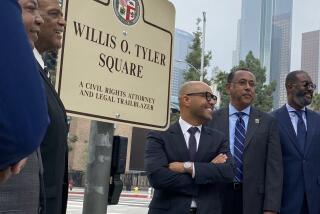A Gladiator in Court and Karate Studio : Lawyer Passes On Samurai Attitude to His Students
- Share via
Dressed in a gray suit and driving his sleek black Porsche Carrera targa, Alan Weil looks every bit the stereotypical LA LAW-yer.
He arrives at a West Los Angeles studio, and goes to a back room to change out of what he calls his “lawyer’s costume.” Moments later, Weil emerges, his 5-foot, 6-inch frame wrapped in a white karate gi tied with a fraying black belt.
The 42-year-old corporate lawyer, who years ago left his job as a federal prosecutor in the U.S. attorney’s office because he didn’t make enough money, is now doing pro bono work--in karate.
Weil is a trial lawyer and partner in the Century City law firm Armato, Gaims, Weil, West & Epstein. But twice a week, as a UCLA Extension instructor, he teaches a handful of students the art of Shotokan karate and self-defense techniques at the West L.A. Karate School. Weil turns over his $400-a-semester fee to the karate school.
Although there might not appear to be a connection between law and karate, Weil insists that there is, for him.
“When I get ready to try a case, I’m taking on the role of a warrior for a client. I try to take on the attitude that a samurai would,” said Weil, who holds a third-degree black belt. “If you’re not willing to take the risk . . . then I don’t think you can be a great trial lawyer.”
Weil’s law partners say he is successful in that role.
“He’s a gladiator,” said Leonard Armato, who specializes in sports law. “I believe that he assumes that role as actors assume various roles. His battlefield is the world of litigation.
“He has a way of carrying himself which is particularly intimidating,” Armato said. “While he is not particularly big in stature, he makes up for it with the aura he projects.”
It is that carriage that Weil tries to pass on to his karate students, who are mostly professional people.
“We teach people how to walk, stand, how to move in certain ways that you’re giving off signals that this is not someone who is a victim. And the same is true with the practice of law,” Weil said. “You have to create the impression that the other side knows they’re up against someone who is not going to be a pushover.”
On the polished hardwood floor of the karate studio, called a dojo, Weil and his seven students do a few stretching exercises and then pair up to practice fending off knife attacks, using four-inch plastic blades. Later, battling invisible attackers, Weil and his students review how to break out of a chokehold.
Weil concentrates on teaching the basic kata, a series of 21 prescribed movements. The Shotokan style of karate that Weil teaches is designed to incapacitate an opponent with a single punch or kick.
“You develop an awareness of yourself and everything around you,” said Joe Reichmann, a federal judge who is taking the class.
“It’s nice to feel like I can take care of myself,” said Leslie Gallagher, 28, who enrolled in the class after she was attacked three times in five years.
Weil began learning karate in 1977 when he took the UCLA Extension class he now teaches from George Takahashi, founder of the nonprofit West L.A. Karate School. He went on to train for several months in Hawaii and eventually earned a first-degree black belt. After leaving the U.S. attorney’s office, Weil traveled for a year to continue training before going into private practice.
Weil has only had to defend himself once with his martial arts skills. While in Tasmania, someone attacked him from behind with a knife. After Weil disarmed and immobilized his attacker, both men were taken to a hospital. Weil needed three stitches in the palm of his left hand; his attacker required orthopedic surgery.
Weil considers the incident a failure. “Most serious students of martial arts don’t get into physical altercations, and it’s considered a failing if it happens,” he said.
Although he’s never been physically attacked in the courtroom, Weil said he applies his martial arts philosophy to his trials.
“Confrontation is very important in the practice of law,” he said. “It’s also important in martial arts in the sense that it’s not so much you’re backing off from a confrontation, it’s that you’re creating an environment in which the other person doesn’t want to confront you.”
More to Read
Sign up for Essential California
The most important California stories and recommendations in your inbox every morning.
You may occasionally receive promotional content from the Los Angeles Times.










